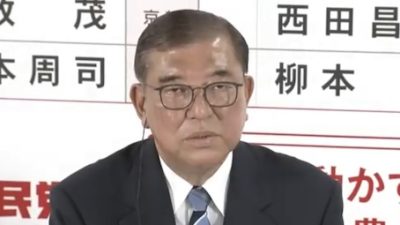PM Ishiba in Election Setback in Japan
Michiyo Tanabe, Noriko Watanabe, and Chika Mori
Modern Tokyo Times

Prime Minister Shigeru Ishiba, leader of the ruling Liberal Democratic Party (LDP) and its junior coalition partner Komeito, suffered a setback in the House of Councillors election. As a result, Ishiba is expected to face increasing internal pressure and growing discontent within the LDP
The LDP and its coalition partner Komeito fell short of their pre-election target of securing at least 50 of the 125 contested seats needed to attain a majority in the upper house.
The political outlook appears bleak for Ishiba. Historically, the last three LDP prime ministers who lost their majority in the upper house resigned within two months. Analysts had warned that a major setback in this election could lead to a similar fate for Ishiba.
The BBC reports, “Support for the ruling coalition appears to have been eroded by candidates from the small, right-leaning Sanseito party, which drew conservative votes with its ‘Japanese First,’ anti-immigration rhetoric.”
Although the LDP suffered a political setback, it continues to hold its position as the leading party in Japan’s parliament.
Reuters reports, “Polls show that most households want a cut to the consumption tax to address inflation, something that the LDP opposes. Opposition parties seized on it and hammered that message home.”
The fragmentation among opposition parties offers a measure of relief for the ruling LDP.
NHK reports, “Ishiba told an NHK reporter that his party has so far secured enough seats to be the leading party in the Upper House. He said he has to fulfill the pledges he made during the election campaign, such as wage hikes to counter rising prices. Ishiba also said that he is determined to tackle disaster prevention, regional revitalization, and measures to counter the country’s shrinking and aging population.”
Ishiba said, “The path ahead is a thorny one. I will conduct state affairs by deepening discussions with other parties even more carefully than before.”
Ishiba continued, “We are facing a severe situation that can be described as a national crisis. In that environment, what is most important is to avoid a political stalemate.”
Unlike the ruling LDP, the Democratic Party for the People (DPP) and the nationalist Sanseito gained support among the electorate. Like other opposition parties, the DPP advocated for reducing the consumption tax to ease the burden of inflation and pledged to raise household incomes.
The DPP now holds 22 seats, a sharp increase from nine before Sunday’s election. Sanseito also made significant gains, rising from two to 15 seats — enough to independently submit non-budgetary bills in the upper house.
The two recent election results in Japan underscore the fragmentation within its political landscape.
The ruling coalition has lost majority control in both the upper house and the House of Representatives—a rare political event for any government in postwar Japan.

Modern Tokyo News is part of the Modern Tokyo Times group
http://moderntokyotimes.com Modern Tokyo Times – International News and Japan News
http://sawakoart.com – Sawako Utsumi and her website – Modern Tokyo Times artist
https://moderntokyonews.com Modern Tokyo News – Tokyo News and International News
PLEASE JOIN ON TWITTER
https://twitter.com/MTT_News Modern Tokyo Times
PLEASE JOIN ON FACEBOOK